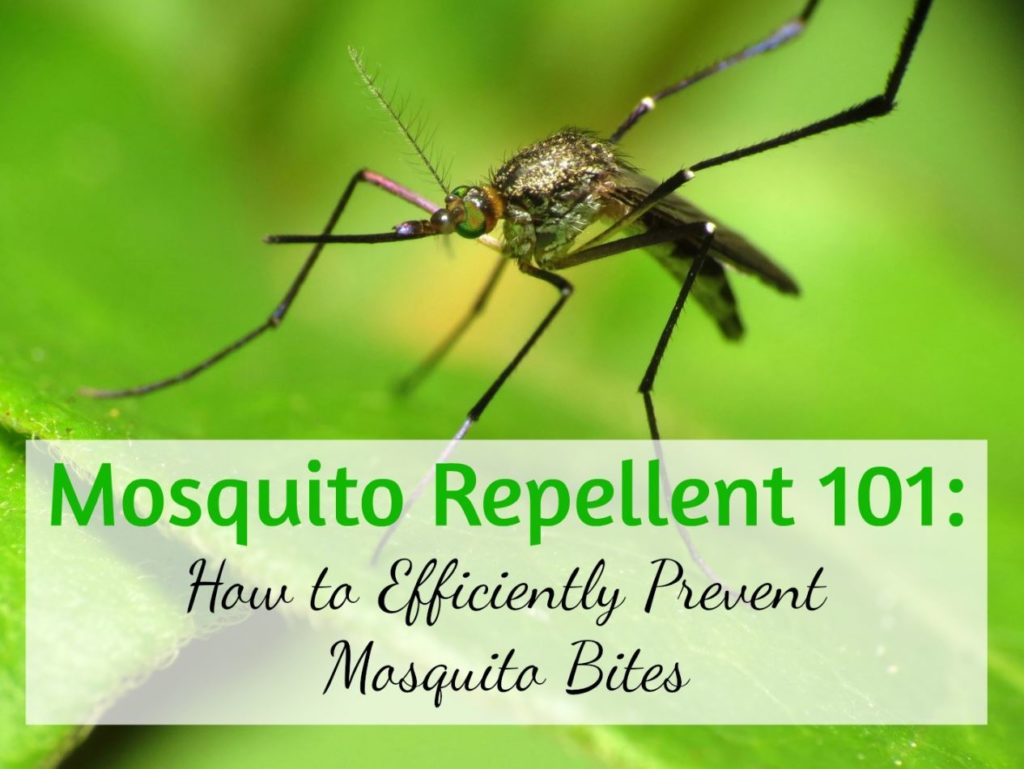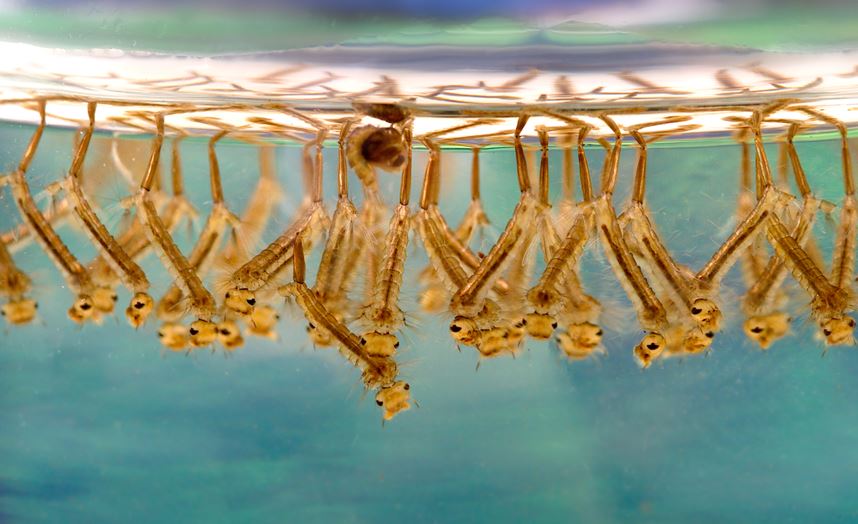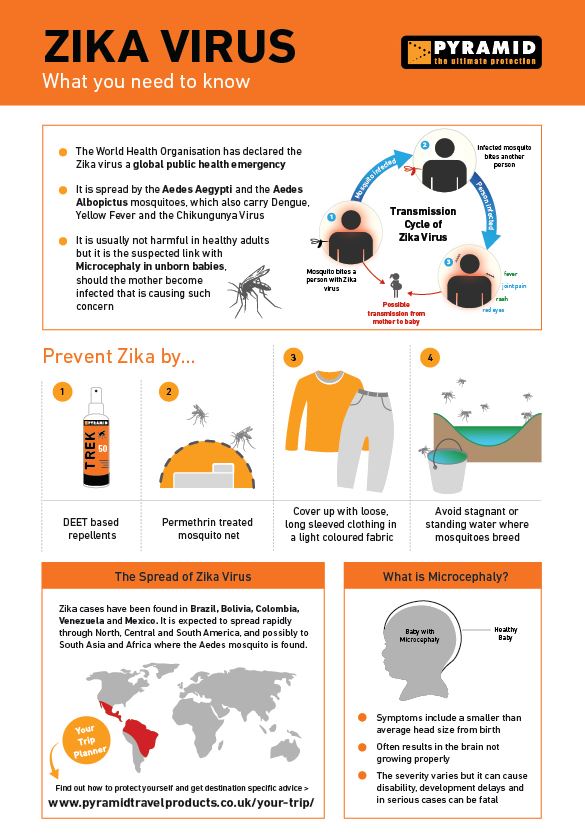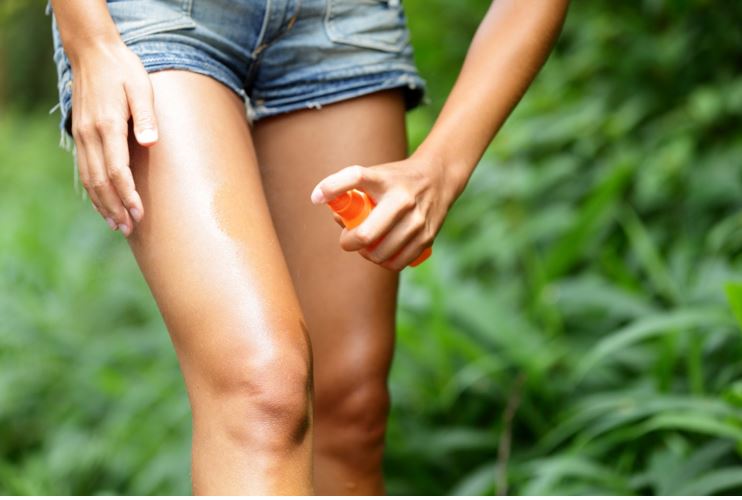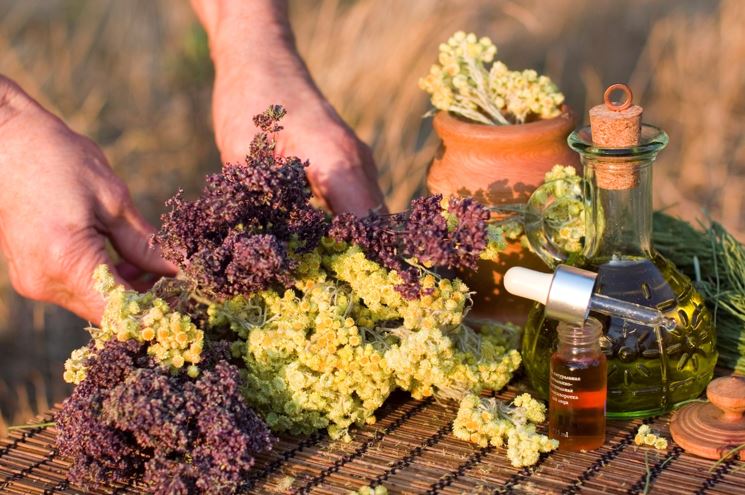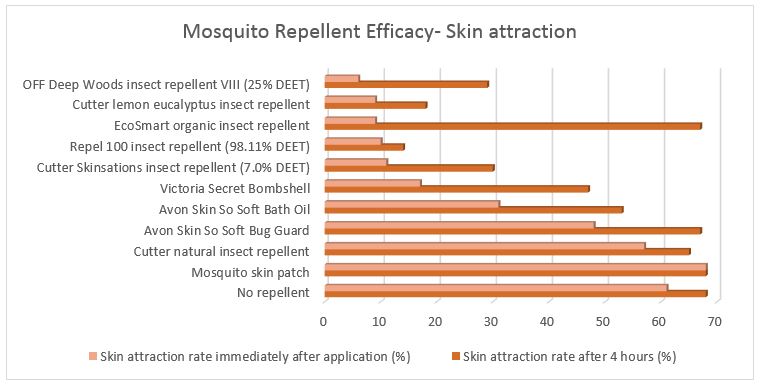With cases of the Zika virus on the rise, efficiently preventing mosquito bites should represent one of your top priorities this summer. This is easily achieved by identifying and regularly using the best mosquito repellent possible. Of course, each repelling solution has different protection ranges depending on the type of ingredients they contain. Yet few of us actually know what each mosquito repellent contains, let alone the effects of the substance in question.
This comprehensive guide will offer you an in-depth look at the best mosquito repellent options so that your summer goes by without a glitch. We’ll be offering you relevant details about what attracts mosquitoes, what drives them away, what repellent solutions contain, and whether the ingredients are safe for each and every member of your family.
“Using an insect repellent is one of the best ways you can protect yourself from Zika and other diseases transmitted by mosquitoes,” CDC ecology and entomology specialist, Harry Savage.
Contents
What You Need to Know About Mosquitoes
There is virtually no animal on Earth to have attracted such widespread antipathy as mosquitoes have done throughout the ages. Granted, spiders and snakes are also disliked, but due to their irritating presence, itchy bites, and nigh-ubiquitous presence, mosquitoes carry the trophy of most hated insect. What’s more, it’s not solely the nuisance factor that comes into play when discussing mankind’s widespread dislike of mosquitoes. It’s also the fact that numerous scientific studies have deemed the insect a carrier for a large number of mankind’s most feared (and deadly) illnesses.
So what is a Mosquito?
Mosquitoes represent tiny flies belonging to the Culicidae family (nematocerid flies). Though similar in appearance, it’s only females that bite, as they need to feed on blood. Another little-known fact: most species do not consume blood and, as such, not all of them transmit infectious diseases. What’s more, in the case of those mosquitoes that do eat blood, their tube-like mouth parts create a high-to-low pressure that prevents disease transmission. Nevertheless, some mosquito species do transmit highly-infectious diseases and their saliva causes a rather irritating rash that we have all experienced at least once.
Types of Mosquitoes
Though there are various types of mosquitoes, we’ll list some of the most common ones:
- Anopheles: Drawn to rain pools, ponds, swamps, and humid areas, representatives rarely feed on humans. Nevertheless, certain Anopheles species are among the foremost carriers of malaria.
- Culex: A species belonging to the Culex genus prefer freshwater habitats. Their importance stems from the fact that they are the primary carriers of St. Louis Encephalitis (a fatal form of viral encephalitis). What’s more, they also transmit the West Nile Virus.
- Coquillettidia: Proven vectors for the Eastern Equine Encephalitis virus (by transmitting it from birds and horses to humans), representatives of the Coquillettidia genus are very aggressive.
- Ochlerotatus: Also drawn to floodwater pools and marshes, representatives of this genus are incriminated in the transmission of dengue and yellow fever.
- Psorophora: Members of this very aggressive genus often feed on large mammals (including humans). They are capable of travelling significant distances and breed primarily in floodwaters, woodland pools, and roadside ditches.
- Mansonia: Another aggressive genus, similar to Psorophora. Representatives of this genus breed uniquely: their larvae rely on aquatic plants (including lettuce, hyacinth, and cattails). The larvae extract oxygen from the plant’s roots by means of an attenuated siphon.
Lifecycle and Lifespan
In order to reach adulthood, a mosquito has to go through three other stages:
For each of the aforementioned stages, a mosquito’s appearance is distinct. Eggs are tied together as “rafts”, floating on the surface of the water. Larvae, however, live underneath the water and need to resurface for oxygen. By shedding their skin four times (molting), mosquitoes become increasingly larger in size, until they change into a pupa and then into an adult. These life cycles depend on temperature and species characteristics, but generally take approximately 10-14 days to complete.
On average, the lifespan of a mosquito is less than two months. Males live significantly shorter lives (10 days) than females (6-8 weeks). Certain females of hibernating species can even live for up to 6 months.
What Attracts Mosquitoes?
Mosquitoes are attracted by humidity, warmth, and carbon dioxide. What’s more, they are also drawn to certain chemicals found in humans’ sweat. Nevertheless, each person’s chemistry is slightly different, that’s why some people are mosquito magnets while others never seem to get bitten. Aside from CO2, there are other chemicals that we release: uric acid, fatty acids, octanol, and lactic acids. Of course, each person releases different concentrations and they form a unique carbon dioxide print- certain prints are irresistible to mosquitoes.
Body odor is another essential factor. Each of us have different bacterial colonies which, in turn, generate different scents- some of which mosquitoes find attractive. Lactic acid build-ups and secretions also contribute to this unique smell.
Last but not least, blood type has also been proven to influence mosquitoes’ behavior and feeding preferences. Specifically, Type O blood is most attractive these insects, while Type A seems to be least preferred by the tiny insects.
Naturally, changing some of these mosquito-attracting factors might help prevent bites. Aside from washing (which helps reduce bacterial colonies on our skins), however, there’s little that we can do.
Mosquito-Transmitted Diseases
Yearly, over 700 million people become infected with a mosquito-borne illness and of these 700 million, 1 million succumb to the illness (Source). Aside from transmitting viruses that affect humans, mosquitoes also transmit parasites that dogs and horses are susceptible to.
Here are some of the diseases that mosquitoes transmit:
- West Nile Virus (WNV): Most common among mosquito-borne diseases. It is often without symptoms or presents with mild flu-like symptoms. In certain risk groups (the elderly or immuno-compromised), the disease can be severe.
- Western Equine Encephalitis (WEE): Transmitted by mosquitoes to humans, horses, and birds, WEE rarely affects humans (since 1964, fewer than 1000 cases were reported).
- Eastern Equine Encephalitis (EEE): Also spread to horses and humans by mosquitoes, EEE is an arbovirus that affects the central nervous system. The disease can present with grave and even deadly complications.
- Louis Encephalitis (SLE): Mosquitoes transmit SLE from infected birds to humans. SLE can present with severe complications in the elderly and the very young.
- Dengue Fever: A mosquito-borne tropical disease diagnosed across Africa, Asia, and the United States, Dengue fever presents with uncomfortable symptoms (which have become more serious in recent years). Nevertheless, its mortality is low.
- Yellow Fever: Another tropical infectious disease occurring in Africa and the Americas. Yellow fever is rare among travelers due to strict vaccination requirements. Still, 30,000 yearly deaths across 33 countries are attributed to this disease.
- Zika: The transmission of this virus has dire consequences, especially due to its association with microcephaly and other foetal malformations. Its symptoms are mild and include fevers, rashes, conjunctivitis, and joint pain.
- Malaria: This ancient disease stems from an infection with the plasmodium malariae parasite, transmitted by the Anopheles mosquito. Annually, over the world, between 300 and 500 million cases are diagnosed and 1 million deaths are reported. Antimalarial drugs are used to cure the disease.
- Chikungunya: The disease presents with symptoms such as fever, joint pains, headaches, rashes, and swelling. There is no vaccine to prevent infection.
Efficient and Best Mosquito Repellent Solutions
Preventing bites relies on so much more than just repellent products. It’s also essential that you eliminate (or at least minimize) mosquito-attracting factors. Here’s how you can get rid of these blood suckers with just a few tiny adjustments:
- Get rid of standing water. As stated before, these insects love ponds, clogged rain gutters, standing waters, creeks, and catch basins. If you can’t eliminate the water, treat it with Bti (bacillus thuringiensis israelensis). This natural substance is fatal to mosquito larvae when eaten.
- Take advantage of light sources. LED lights, yellow bug lights, and sodium lights generally repel mosquitoes.
- Maintain a clean yard. Since mosquitoes take cover in protected areas, try to avoid low-lying vegetation, trim your shrubs, and keep grass short. Such measures also decrease moisture levels.
- Using proven, effective mosquito repellents. We’ll dedicate a larger section to this very vast topic:
Various substances can be used as repellents. A mosquito repellent is any substance that, when applied on human skin, can efficiently prevent mosquitoes from crawling on or biting that certain area. What’s more, they can also be applied on surfaces, articles of clothing, or can be vaporized in order to keep these pests away from certain areas. It can also be chemical, natural, and home-made.
Chemical Mosquito Repellents
There are three main chemicals contained in chemical mosquito repellents:
- DEET (diethyltoluamide)
- IR3535
- Picaridin
DEET
Of these three, DEET is the most widely used. Many producers and users wear by its efficacy, however, DEET mosquito repellent products should not be used on infants younger than 2 months regardless of concentration. In the case of older infants, DEET mosquito repellents should not have a concentration of more than 30% DEET.
Curiously, though, an increased concentration of DEET is not associated with a higher protection, but a longer period of efficacy. Here are some of the most efficient DEET mosquito repellent products:
Repel’s 100 Insect Repellent Pump Spray boasts a 98.11% DEET concentration and a protection duration of 10 hours. Its efficiency has been tracked in scientific studies (see below). Furthermore, it’s considered by many the best mosquito spray.
Sawyer’s Premium MAXI-DEET Insect Repellent Spray also comes with 98.11% DEET and has the added bonus of being nigh-odorless.
3M Ultramarathon Insect Repellent Lotion uses less DEET (34%) but also offers sufficient mosquito repelling punch to merit a spot on our list.
Cutter Backwoods Insect Repellent also uses DEET (25%) to efficiently protect against mosquito bites.
IR3535
IR3535 (Insect Repellent 3535) is a synthetic insect repellent commonly used in DEET free mosquito repellent products. Here are some of the best IR3535 mosquito repellents:
Avon Skin-so-Soft Bug Guard Plus IR3535. This easy-to-apply lotion has a pleasant fragrance and efficiently protects against mosquito, ticks, back flies and many more. It comes both in spray and lotion form and provides protection for up to 8 hours after application.
Coleman SkinSmart Insect Repellent Spray . This mosquito repellent also offers protection for up to 8 hours, is easily applied, and can be applied by the entire family.
Picardin
Developed in the 90’s, Picaridin comes in formulations of up to 20% active substance and smells notably better than DEET. Here are some of the best Picaridin-containing mosquito repellent products:
Sawyer’s Premium Insect Repellent (20%) boasts a 12-hour-long efficacy against mosquitoes and can be used safely by the whole family.
Avon Skin-so-Soft Bug Guard Plus Picaridin Spray prevents mosquito biting for up to 7 hours, DEET free, and has a light feel.
Natural Mosquito Repellents
For those who avoid DEET and other chemicals for individual reasons, there are always natural alternatives that work as great mosquito repellents. Some of the best mosquito repellents are plants. Numerous studies, including a Duke study suggests that prolonged and frequent DEET applications result in neuron death in brain areas responsible for memory, muscle movement, learning and concentration. Other studies also question the safety of daily dermal exposure to DEET.
Here are some of nature’s best mosquito repellents:
- Citronella: one of the most common ingredients in mosquito repellent products, citronella is the result of the distillation of two grass species. Though used frequently in concentrations of up to 10%, research has shown that citronella mosquito repellent only offers protection of up to 20 minutes.
- Oil of lemon eucalyptus: another plant-based mosquito repellent, OLE is similar in efficacy to low-concentration DEET products and can provide protection of up to two hours.
- Catnip has captured the attention of mosquito-repellent manufacturers when a surprising study revealed that it may be ten times more effective than DEET at preventing mosquitoes.
- Lavender: commonly used as a dilution alongside coconut, sweet almond, or apricot kernel oil, lavender is also a great natural mosquito repellent.
- 2-undecanone, found in certain mosquito repellents and derived from the tomato plant, has proven its efficiency and can provide mosquito protection of up to 4.5 hours.
- Organic soy oil has been shown to have an efficiency comparable to DEET mosquito repellent products. Aside from its mosquito repelling properties, it also acts as a moisturizer and, as some research suggests, can even slow the growth of bodily hair.
- Lotus and black pepper also show mosquito repelling properties, a study suggests.
- Neem oil: research conducted by the US National Research Council has suggested that Neem Oil is more effective than DEET when it comes to repelling mosquitoes.
Homemade Mosquito Repellents
Homemade mosquito repellent solutions are different combinations of the aforementioned natural repellents diluted with oils or water. Here are some great recipes:
- Lemon Eucalyptus Mosquito repellent. Simply mix the lemon eucalyptus oil with 10 parts sunflower oil and apply on skin.
- Garlic & Lemon Juice. An affordable and efficient solution. Mix minced garlic and mineral oil, let it sit for at least 24 hours, add the lemon juice, strain and apply on skin.
- Lavender & Vanilla. A sweet-smelling combination of 15 drops lavender oil and 4 Tbsp vanilla extract. Mix everything with distilled water and a bit of lemon juice and apply or spray on the skin.
- Hazel & Castor & Citronella. Mix 1 part citronella oil with 15 drops eucalyptus oil, 6 drops of sunflower oil, 5 drops cinnamon oil and a bit of castor oil. Mix well and apply.
- Neem & Soap. This simple mixture requires 2 parts neem oil to 1 part liquid soap and distilled water to fill the bottle.
Safe Mosquito Repellent Products: Pregnancy-, Infancy-, and Children-friendly Options
As with sun protection, the strategy to protecting your little ones from mosquitoes should be multi-fold. Children are susceptible to the effects of various chemicals, therefore, you should experiment with all-natural mosquito repellents first.
The first solution would be to cover up. Tuck shirts and pants, use long sleeves, and hats. Another idea would be to avoid the use of perfumes and scented lotions, as they attract multiple insects. Mosquito netting for the stroller or house windows can also be effective. In extreme situations, you should consider treating clothes with Permethrin.
The Centers for Disease Control (CDC) recommends the use of mosquito repellents that have been demonstrated to work through actual scientific trials. DEET products with concentrations lower than 30% can be used for children, but not on infants that are younger than 2 months. Picardin, which is as effective as DEET, but does not cause skin irritation, can also be used to protect children & infants.
This brings us to the last problem: what types of mosquito repellents should pregnant women use? After hearing about the Zika outbreak in parts of the Americas, many women have started to worry about how they can protect themselves against mosquitoes. The CDC has cautioned American mothers to postpone their travels and to use mosquito repellents that are registered with EPA (considered safe for pregnant & breast-feeding women). IR3535 & lemon eucalyptus sprays are not recommended.
Effectiveness of Mosquito Repellent Products
A 2015 study published in the Journal of Insect Science examined the effectiveness of mosquito repellents and concluded that DEET containing repellents were the most effective, although a non-DEET repellent spray performed very well.
Similarly, another study published in the Journal fo Parasitology Research aimed to evaluate the repellency over time in the case of three particular repellents: DEET, citronella, and fennel oil. Their results showed that:
- The repellency of citronella oil decreased by 26.5% in the first hour and 13.7% in the next hour.
- The repellency of fennel oil decreased by 27.4% in the first hour and 13.8% in the next hour.
- The repellency of DEET mosquito repellent products did not decrease over a 6 hour period.
Of course, each type of repellent should be chosen based on the overall exposure time that you expect, as well as other considerations (discussed below).
How to Apply Mosquito Repellent
Mosquito repellent is certainly a good way to ward off disease-carrying critters, but chances are that you’ve been applying it wrong and minimizing its efficacy. Here’s how you should be applying repellents:
- Be thorough. Most people do not apply mosquito spray thoroughly enough. Make sure all exposed body surfaces are covered, but avoid getting repellent in your mucoid tissue or eyes.
- Do not spray repellent directly onto face. First spray on hands then rub gently on the face.
- Use spray sparingly around the ears.
- Do not spray in enclosed areas. After returning indoors, treat your skin with soap and water.
- Avoid cuts, wounds or irritated skin.
- Use just enough spray to cover exposed skin.
- Wash treated clothing before wearing it again. You can also protect polyester & nylon equipment (e.g. tents, climbing gear etc.), by using the spray and waiting for it to dry before putting anything on or climbing inside.
Additional Repelling Methods and Tips
There are other, less-toxic ways to fight back against mosquitoes. Some of them work, others not so much. For example, there is a lot of talk about the “best mosquito zappers”, or the “best outdoor mosquito foggers”. While the latter solution works, zappers might disappoint you.
Zappers are supposed to electrocute loads of bugs, but a recent study revealed that only 0.13% of bugs killed are mosquitoes. But we won’t bother you with mosquito repellent solutions that don’t work.
Here are the ones that do:
Mosquito-repelling Attire
You can minimize the risk of bites by wearing mosquito protection clothing, such as long-sleeved shirts, hats, boots, or long pants. It is also recommended to tuck pants into socks & shirts into pants to reduce risks. Some repellents e.g. permethrin), can be applied to mosquito repellent shirts and clothing.
You can find mosquito resistant clothing directly in the store (permethrin-treated clothing will retain its properties through multiple washes).
Indoor Repellents
Mosquito repellent candles, particularly citronella candles, represent one of the most popular forms of protection. Keep in mind that, while most Mosquito Candles work, the inhalation of fumes & chemicals may result in respiratory problems.
Liquid vaporizers, foams, plug-in mats, nets, and oils can also be used to keep mosquitoes away, but their effectiveness varies from one manufacturer to the other.
Best Mosquito Repellent for the Outdoors
- Organic Mosquito Repellents for the Yard. The use of traditional mosquito repellents will invariably expose you to chemicals that may harm your health or result in allergic reactions. There are several plants that we have already presented, with mosquito repellent qualities (e.g. lemon grass, catnip, marigolds, rosemary, etc.). Using them you can create organic all-natural mosquito repellents (e.g. celery juice, rosemary & catnip homemade mosquito repellent spray, lemon grass repellent, etc.).
- If you have a pond you can stock it with guppies, which reproduce extremely quickly, to get rid of mosquito populations. Alternatively, you can invest in a frog pond or build a bat house to reduce its population.
- The best outdoor mosquito foggers will make summers outdoors bearable. These extremely practical devices are indispensable if you spend time in areas that are heavily populated with mosquitoes.
- Traps – check out our comprehensive Mosquito Trap guide
“ULV (ultra low volume) insecticide is probably the best way to kill adult mosquitoes (…) If you’re having company over at 7, and you fog at 6, you’re going to take care of most of the mosquitoes. But tomorrow night, if you haven’t gotten rid of the buckets in your yard, or your neighbor’s yard, they’re going to be back.”
Source: Waterreves.
You’ve made it to the end of the guide! Congratulations! Now you know all there is to know about commercial & natural mosquito repellents, how they work, and how they should be applied. What are best mosquito repellent did you use? We’d love to know what you tested and what worked for you.

